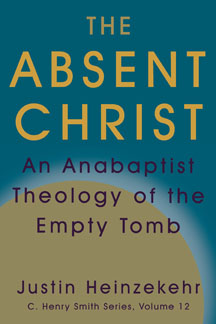|
 |
||||||||
|
|
Cascadia home | ||||||||
Summary (also available through PDF flier):
Justin Heinzekehr explores the significance of the empty tomb and
Jesus’ physical absence for Anabaptist ecclesiology and
theology
in conversation with postmodern philosophy and power analysis. The
majority of Anabaptist theology has wrestled with the life and
death of Jesus, but what about the biblical accounts of the liminal
space in between? In The
Absent Christ, Heinzekehr asks how Christ's physical
absence defines and challenges the way we live in our communities. Drawing on a wide variety of
philosophers, including Emmanuel Levinas,
Alfred North Whitehead, Gilles Deleuze, Elisabeth Schüssler Fiorenza,
Karl Marx, and Catherine Keller, Heinzekehr constructs a new Anabaptist
theology that takes the gospel stories of Jesus’ absence as seriously
as his life and teachings. “Looking for divinity in the faces of those around us, rather than in otherworldly places or merely in our own religious performance, is not the end of theology but rather its beginning. And it puts a healthy spin on a question I have raised for years, ‘What is Jesus doing now?’” —Joerg Rieger, Distinguished Professor of Theology, Cal Turner Chancellor's Chair in Wesleyan Theology, Director of the Wendland-Cook Program in Religion and Justice, Vanderbilt University “For centuries, the empty tomb has been at the heart of Christian belief and practice. But never have I seen the Christian affirmation of the present and absent Christ spelled out so clearly and insightfully for the postmodern world. In these pages Anabaptist theology finds its prophetic voice again.” —Philip Clayton, Author, Transforming Christian Theology “Heinzekehr
has undertaken and is offering us something important: a work of
constructive, contemporary Mennonite theology developing christological
reflections on the pressing questions of environmental crisis, what
this means to 'people of God’s peace' and how we might follow an
'absent Christ.' I also applaud the gentle invitation to reconsider
metaphysics—or 'micro-metaphysics'—found in these pages and through the
evocative image of the joyful darkness of a cool, empty tomb.” —Malinda Elizabeth Berry,
Assistant Professor of Theology and Ethics, Anabaptist Mennonite
Biblical Seminary “With
this book, Justin Heinzekehr suggests that we discuss Christology and
the presence of God in the world in terms of ethical relationships
developed in the absence of Christ materially present, as symbolized by
the empty tomb. With this restatement, Heinzekehr joins a long
tradition of expressing the meaning of Jesus by use of language and
images from new and thus ever changing contexts.” —J. Denny Weaver, in the Series
Editor’s Preface Publisher: Cascadia
Publishing House LLC |
|||||||||
|
|
|||||||||




